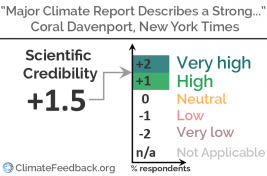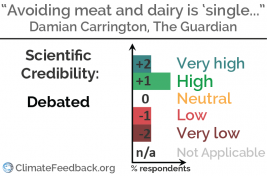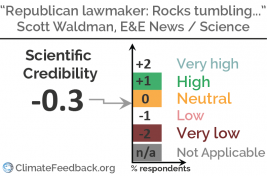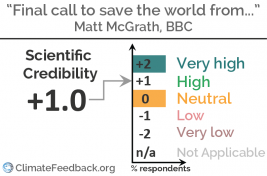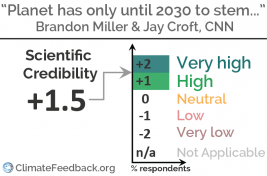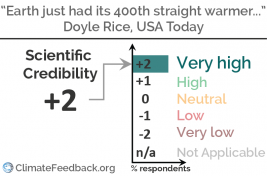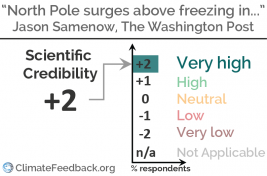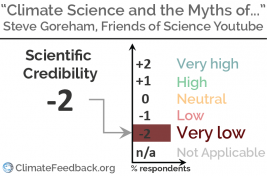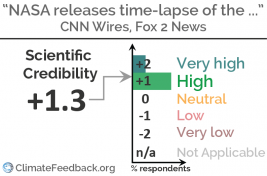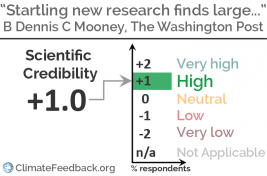Article Reviews
“Is this article consistent with the latest thinking and knowledge in science?”
“Would experts in this field endorse the main message of this article?”
These are the types of questions our “feedbacks” are designed to answer. If the feedback is positive, you can generally assume the information you’re reading is of high credibility. If it’s negative, however, you may want to read with extra care and attention — some of the information contained and conclusions reached are not consistent with science.[1]
New York Times’ coverage of IPCC report clearly presents conclusions
in The New York Times, by Coral Davenport
This story in The New York Times covered the October release of the IPCC's "Global Warming of 1.5 °C" report. Scientists who reviewed the story found that it provided an accurate and detailed summary of the report, though some statements about warming being "worse than previously thought" could have used some clarifying context.
— 24 Jan 2019
Guardian story on climate impacts of diet gets mixed reviews from scientists
in The Guardian, by Damian Carrington
"The word “Avoiding” in title and text is overly strong and should have been “Reducing”. Adopting a vegan diet is not necessary, but a reduction to having meat 1-2 times a week and dairy 3-4 times a week would suffice. In fact, flexitarian diets utilize natural resources much more efficiently than vegan diets[1]. In the article, Peter Alexander is quoted saying something to the same effect."
— 23 Jan 2019
Story on congressman’s incorrect claims about sea level rise could have corrected them more explicitly
in Science Magazine, E&E News, by Scott Waldman
"The comments from the members of the Committee suffer from severe inaccuracies and misconceptions, and citations of the invited climate scientist mostly address those issues. In general, the views that go against our understanding of the climate change process are underlined and presented as such by the author, but rarely supported by statements or explanations that go beyond the immediate replies from the invited climate scientist. Some of the inaccurate statements quoted in the text are thus left with an incomplete challenge."
— 22 Jan 2019
BBC article on IPCC report is mostly accurate, but could use some clarification
in BBC, by Matt McGrath
"Scientifically, the article is overall correct, but it is in cases inaccurate in its description of certain aspects of the IPCC. For example, the IPCC does not conduct research, but assesses the available scientific evidence. The article also provides statements without context, despite this being essential for their interpretation."
— 21 Jan 2019
CNN accurately covers latest IPCC report
in CNN, by Brandon Miller
This CNN story covered the October release of the IPCC's "Global Warming of 1.5 °C" report. The report, which was requested by governments during the 2015 Paris Agreement negotiations, details the impacts of 1.5 °C compared to 2 °C and the emissions cuts required to limit warming to either of those levels. Scientists who reviewed the story found that it conveyed the information in the report without any errors, and included comments by scientists to summarize the report's implications.
— 19 Jan 2019
USA Today story updates readers on trend in monthly global temperatures
in USA Today, by Doyle Rice
"The piece accurately reports the surface temperature record warming of recent decades and joins the dots appropriately to the underlying cause of human emissions. It appropriately draws the distinction between regional/national records and the global mean behaviour. The included quotes are to authoritative sources."
— 14 Jan 2019
Washington Post article accurately discusses warm Arctic weather event
in The Washington Post, by Jason Samenow
"This article accurately describes the Arctic warming event and associated surprise by scientists, includes multiple explanations for possible causes, and does not overstate any connections to climate change, pointing out that more data is needed to know if these above-freezing events will be a new Arctic normal."
— 14 Jan 2019
Popular “Friends of Science” video promoted by Youtube presents long list of climate myths
in Friends of Science, YouTube, by Steve Goreham
"The video presents a litany of the usual climate denier talking points, none of which hold any water. It is full of outright false claims and does not even shy away from presenting a fake TIME magazine cover that supposedly warned of an ice age. “Friends of Science” is an advocacy group “largely funded by the fossil fuel industry”"
— 21 Dec 2018
Popular story on Fox2Now accurately describes 2017 global temperature, sea ice extent
in Fox2News, CNN, by Brandon Miller
"The article is factually correct. The reality that Arctic sea ice is getting younger is not so well known from the public, so such an article is welcome. The article’s title and the front video are about sea ice, but most of the rest of the text is about global temperatures."
— 04 Dec 2018
Washington Post accurately describes ocean warming study (which has since been corrected)
in The Washington Post, by Chris Mooney, Brady Dennis
"The Washington Post article accurately reports the results and links to other topics using reliable sources. Quotations from Pieter Tans and Paul Durack add important caveats showing that this is strong new evidence but not the final say. This caution is vital for readers to interpret the findings."
— 03 Nov 2018
[1] Note: These feedbacks do not constitute endorsements of the author’s political or economic ideology, rather they are assessments of the scientific foundations and reasoning of the argumentation contained within each article.

